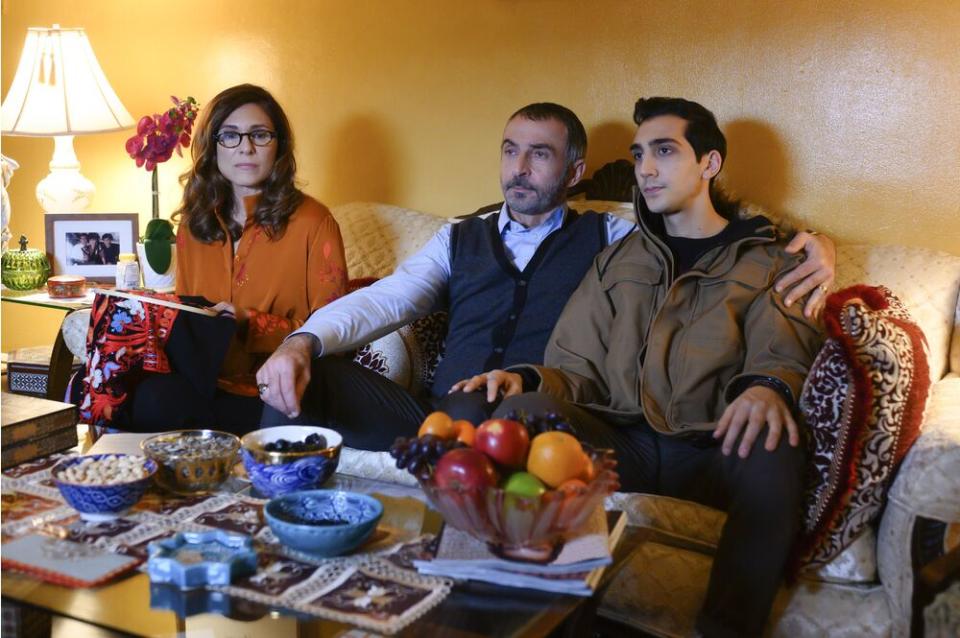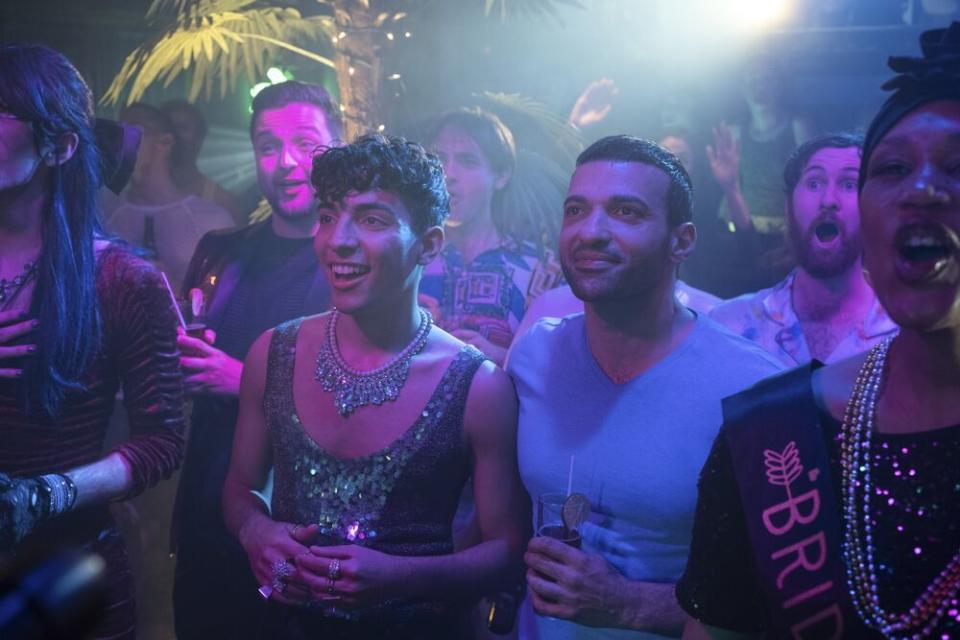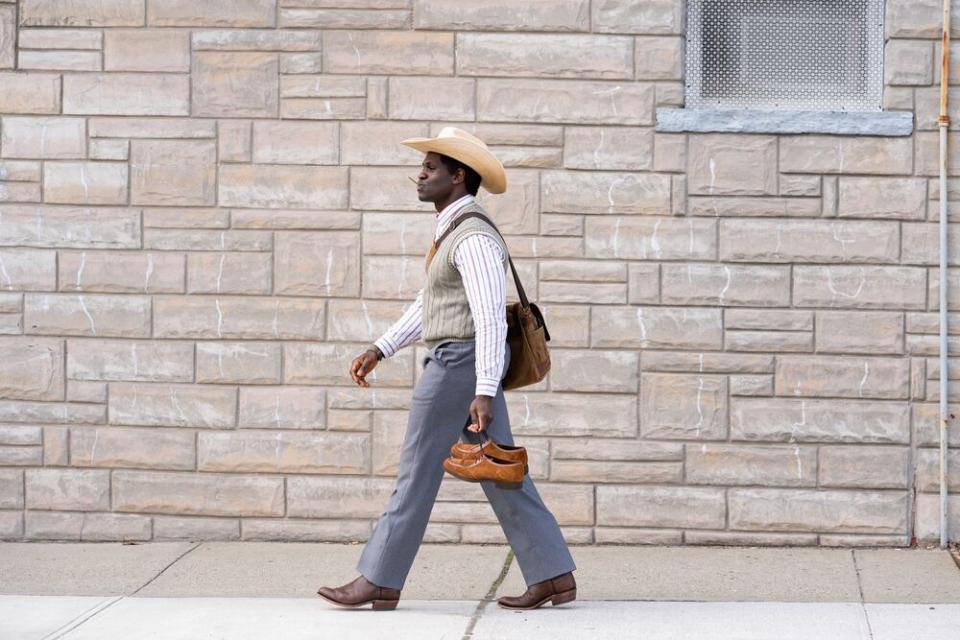Kumail Nanjiani on showcasing the immigrant experience(s) you haven't seen in Little America
Kumail Nanjiani has gone big with his next project — make that global — unspooling stories of immigrants from all over the world who found their way to the United States. The Silicon Valley alum (and star of the upcoming films The Lovebirds and The Eternals) serves as a co-creator and executive producer of Little America, a now-streaming Apple TV+ anthology series inspired by the real-life immigrant stories featured in Epic magazine’s Little America series. The tales tucked into this melting pot of a series are hopeful, heartwarming, heartbreaking, humorous, and humane — and, of course, they’re just a tiny sampling of the immigrant experience(s). Here, Nanjiani takes you inside the ambitious, stereotype-dashing, critically acclaimed series, which has already been renewed for a season 2. “There are so many stories that we already have, and hopefully once people watch, they’ll contact us with more stories,” says Nanjiani. “That’s the thing: we’re never going to run out of interesting stories to tell.
ENTERTAINMENT WEEKLY: What was the most intriguing challenge for you and your fellow producers [including wife Emily V. Gordon, Lee Eisenberg, Alan Yang, and Sian Heder] in bringing Epic magazine’s Little America series to TV life?
KUMAIL NANJIANI: We wanted to make short films that were completely different tones. We wanted some to be funny, some to be romantic, some to be thrilling. We didn’t want there to be really too much overlap between them. That’s what was challenging but also exciting — doing eight clearly different stories that are tied together with this very loose concept.
You moved to America from Pakistan at 18 and studied computer science and philosophy before becoming a comedian-actor. Obviously, there is no one immigrant experience, but how did your story help shape the show’s vision?
It was exactly what you said, that no one story is the same. A lot of times when you hear the word immigrant, the image you get in your head — no matter how you feel about immigration issues — seems to be pretty monolithic. So the traditional immigrant story that you hear in the news or pop culture — I knew that mine was different than that. What I brought to it was knowing that every single story is completely different and as varied as the human experience.
Immigration is a polarizing issue in the U.S. right now. Did that make this an ideal time to share these stories?
We’re in an era where it’s a very, very hot button issue. The only way that guided us was in that we did not want these stories to be political in any way. You’re making a show about immigrant experiences — inherently, it’s going to be politicized and there’s nothing you can do about that. But we just wanted to present entertaining, moving, funny, poignant human stories. If anything, the current situation made us not want to not be political at all — as much as we could help it.
What does Hollywood often miss in its portrayal of immigrants?Painting them with the same brush — either demonizing them or making them feel noble, or assuming their life has been full of hardship. To me, [that] idea is just as condescending and reductive as stereotyping them in a negative way. Immigrants are just human beings, which means they can be everything that a human being can be. They can be messy and complicated. That’s what we wanted to show. The only thing that immigrants to America have in common is that they moved to America. I feel like Hollywood sometimes wants to tell a very specific immigrant story, whereas we wanted to break that notion. I mean, we have a story about a gentleman from Nigeria who wants to be a cowboy. We have a story about a woman from Uganda who wants to bake cookies. These are completely different experiences — and not the stories I’ve really seen. Ones with massive stakes, ones with tiny stakes. It’s not always life-or-death. Sometimes it’s just about wanting your kids to spend some time with you.
One of my favorite moments is in “The Rock,” [which Nanjiani co-wrote], where the Iranian-born Faraz tells the real estate agent, “People think I escaped Iran. I had a great life in Iran. I came to America to provide my family new and excellent opportunities. That was my choice, so please, don’t feel sorry for me.”
One of the theses of the show is that we wanted to break down the idea that all these immigrants are escaping some sort of thing. Obviously, that’s part of a lot of immigrant stories, but we’ve seen a lot of those stories and certainly, our show has had some of that as well. But we did not want that to be the connective tissue between all of them.

How wide was your net in the casting process?
Initially, it was challenging because we wanted to find people who are authentic to the stories that we’re telling. If a character speaks a specific dialect of a language from a specific country, we wanted a native speaker. We wanted someone who wasn’t going to learn it phonetically. Obviously, it seems like it’s a little challenging. But here’s the thing: these very, very talented people from all kinds of backgrounds are out there and finding them is not impossible. It’s not impossible to find people who are extremely talented and are from a very specific part of the world. It can be very easy for Hollywood to just look at the names they know.
Our casting people [led by casting director Bernie Telsey] were absolutely amazing. When we first started doing the show, I was like, “Well, it’s going to be so hard to find someone who can speak to very specific dialect.” It’s only challenging in the fact that they have not gotten an opportunity and they may not have extensive IMDB pages. It’s not challenging in that they are very talented. Sometimes you put out open casting calls. If you look back on mine and Emily’s Twitters [from] a year ago, you’ll see us tweeting, “Hey, we need a boy of Indian origin who is 8 years old.” So it was challenging in the fact that you couldn’t go down the usual roads, but not challenging in the fact that there are very, very talented people out there who haven’t gotten their shot yet.
You’re also giving even some recognizable actors a chance to play rich, deep, non-stereotypical characters. Shaun Taub [who stars in “The Rock”] told you that he had been acting for decades and he’d never acted in a project where he was every scene.
Shaun is absolutely amazing. Yeah, he said, “You know, it’s really tiring.” [Laughs] It was very exciting for me just as a fan to watch their performances. We were in editing, so I’ve seen so many takes of all of these wonderful actors and how [they] bring so many different things to each take. Our job in that regard was very easy. We found talented people and then we just let them do what they do really, really well. So for me, it was just exciting as someone who likes watching compelling actors, to just watch these uncut performances and watch them jump through different obstacles over and over and over. And so many of those actors, I mean, I would say most of them, are ones whose work I was unfamiliar with, so I suddenly became a fan of all of them.
What was the most fortuitous moment in the casting process?
For Rafiq’s [Haaz Slieiman] episode, we cast Adam [Ali] who is from Libya and we couldn’t get him a visa to come to America because there was a ban on people from Libya coming into America. Apple was kind enough to move production to Canada for one episode so that we could do a story about someone from Syria coming to America, ironically. So for a show about coming to America, seven of the episodes are shot in America and one is shot in Canada.

There are a few casting surprises, including Zachary Quinto playing the meditation leader in the silent episode with the French immigrant. How did that come about?
That decision came in the edit. That was not shot as a silent episode. Zachary Quinto actually had a lot of lines. He speaks in the whole episode and the two leads were always going off and talking, and they knew much earlier in the episode that they didn’t speak the same language. But at some point, we made the decision, “Hey, this might be really cool as a silent episode.” It really worked that you wait till the end of the episode to realize, “Oh, it’s two people who are falling in love with each other who don’t speak in language.” But the only downside to that was we had to lose, unfortunately, a lot of Zachary’s performance, which was so fantastic. He has these monologues that were really wonderful — and really funny too. So it’s a part of his performance that only we get to see that the rest of the world won’t get to see which is a little unfortunate, but he was very understanding. The director of that episode, [co-showrunner] Sian Heder, called him and said, “Hey, we’ve made this decision so, unfortunately, we’re going to have to lose all your lines.” And he was very excited. He was like, “Of course! That sounds great. It sounds like creatively that’s the right thing to do.”
But also: Release the Zachary cut!
If you can get that trending, I promise you we will.
Behind the camera, you often went beyond Hollywood’s usual players, too, including Pulitzer prize-winning playwright Rajiv Joseph. How did you select the writers and directors for each episode?
Because so many writers for so long have been a very homogenous demographic, we had to look for people who hadn’t had their credits in a writers’ room. We ended up using a lot of playwrights, or novelists, because we couldn’t really use traditional writers’ room writers for a lot of the episodes. That was exciting. Tze [Chu], who directed “The Grand Prize Expo Winners” episode, happened because he had a meeting with one of the producers and he told the story of [how] his mom used to always win these vacations and take the family on them. And we were like, “Oh my God, that’s amazing.” So he got to write and direct the story of his own mom and he cast a guy to play himself. That was very, very satisfying.

How involved were the subjects of the stories in these adaptations?
They told Epic their stories. And then once we started working on the stories, we would contact them if we needed more details or if there was something that we thought was missing. But for the most part, they were not involved in the actual writing of it. A lot of them have recently seen the episodes. Their reactions have been extremely satisfying because they’ve all been very moved by it. But we really wanted to use the stories as jumping-off points. So, beyond them telling us their beautiful stories in much detail, they were not involved with the adaptation.
Whose reaction stands out as your favorite?
Well, I’ll say that Uwegbuna, the Nigerian cowboy — his daughter came to set and was really moved by the fact that she’d heard all these stories from her dad, but now she got to see them in a way. [Laughs] So all these stories that she’d grown up with, for the first time she was able to actually see what it was like. That was very exciting — and it was something that I had not anticipated.
What message do you hope that people ultimately take away from the show?
We don’t want this to be a medicine show. We want this to be a show that’s entertaining to watch. And we want it to be a family show. Everybody could watch this show and get something out of it. These issues that have come highly politicized involve very real people with very real stories, very real dreams, and very real lives. So no matter what your political beliefs are, the message that you get is that these people are just like anybody else and that what they’re looking for is what everybody’s looking for: food, love, and a place to live.
Related content:
• Apple TV+ drops first trailer for heartwarming immigrant series Little America
• Issa Rae and Kumail Nanjiani try to solve a murder in The Lovebirds first trailer

